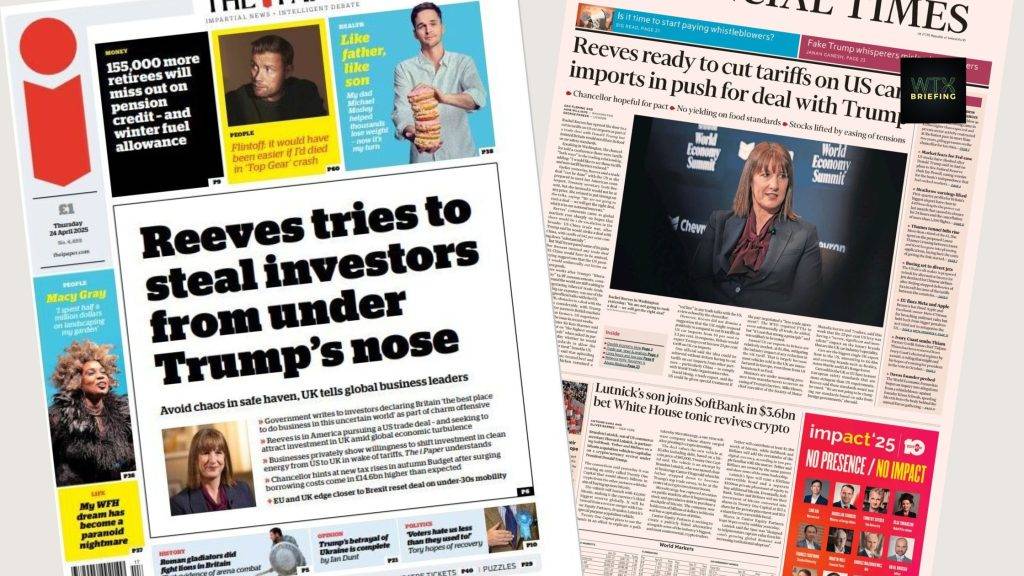Rachel Reeves in Washington – The chancellor is back on the front pages this morning ahead of a meeting with her American counterpart. Rachel Reeves is in Washington in hopes of securing a trade deal but has warned she will not rush it.
Yesterday, the IMF significantly downgraded the UK’s growth forecast, saying the UK will be amongst the hardest hit by the global trade war. The ongoing tariff war between the US and China remains high and there will be considerable spillover effects on the global economy, that could make life worse. That’s why the chancellor is in Washington at the moment, she’s trying to secure a tariff reduction that could temporarily assist specific UK industries.
The papers report Reeves is telling investors to back Britain, saying it is the safest place to invest in this uncertain world!
Rachel Reeves in Washington as she tries to lure investors to Britain



Reeves ready to cut tariffs on US car imports in push for deal with Trump
Explainer: This headline frames Reeves as proactive and cooperative, using “ready to cut” to suggest willingness to compromise. It casts the trade deal in a positive light, aligning it with diplomacy and progress, while downplaying any potential controversy over cutting tariffs.
- The FT says the chancellor told a crowd in Washington that the UK was ready to cut tariffs on US car imports, saying “we are not going to rush a deal.” The paper notes there was a sharp rise in global markets with hopes tied to the US-China trade war winding down.
Ministers prepared to cut car and farm tariffs to ease US trade
Explainer: This headline uses neutral, pragmatic language like “prepared to cut” and “ease” to suggest a calm, strategic move. It frames the tariff cuts as a necessary step toward improving trade, while avoiding mention of possible downsides for domestic industries.
- The Times says Britain is prepared to slash tariffs on US cars and agricultural products such as beef and chicken to secure a trade deal. “I believe in free trade, but I also believe it needs to be fair trade.”
Reeves tries to steal investors from under Trump’s nose
Explainer: This headline uses dramatic and combative language (“steal” and “from under Trump’s nose”) to create a sense of rivalry and tension. It frames Reeves as bold and assertive, while also implying a political power play rather than a straightforward economic move.
- The i says the chancellor is trying to “steal investors” from under Trump’s nose. The government is writing to investors declaring Britain the best place to do business in this uncertain world as, what the paper says, is part of her charm offensive.
Rachel Reeves dashes hopes of early breakthrough in UK-US trade deal
Explainer: This headline uses disappointment-focused language (“dashes hopes”) to suggest a setback or failure. It places the responsibility on Rachel Reeves, framing her as the main reason for stalled progress, which could influence readers to view her actions negatively.
- The Guardian says Rachel Reeves has dashed hopes of an early breakthrough in trade talks with the Trump administration, stressing that the UK is “not going to rush” into a deal. “We’re not going to rush a deal. We want to get the right deal that’s in our national interest, and those talks are ongoing,” she said.


